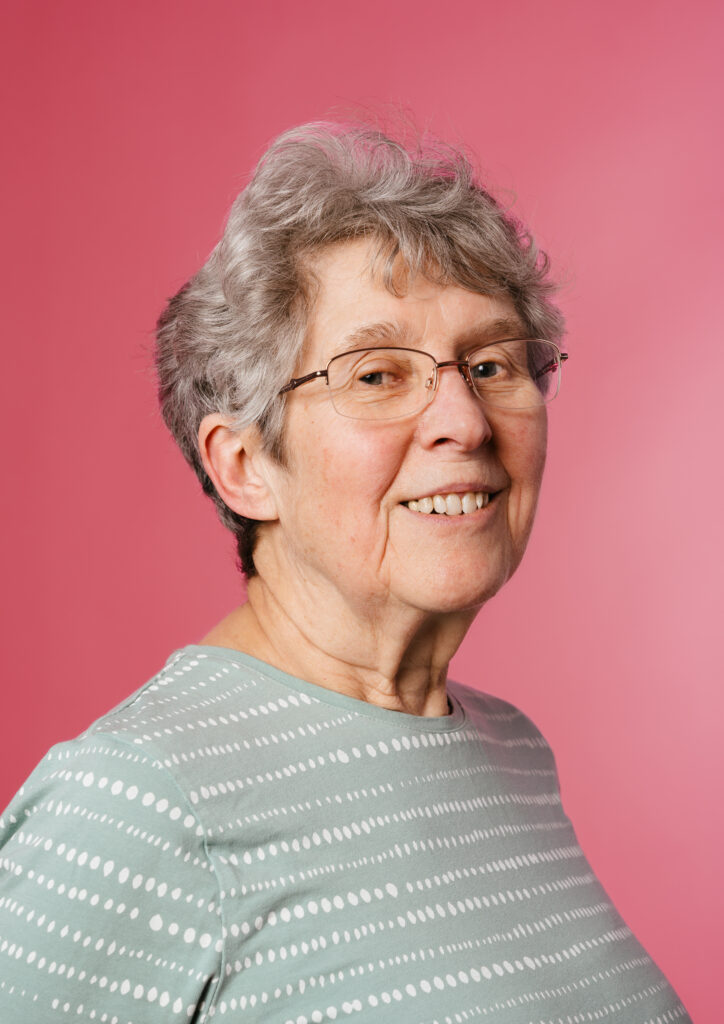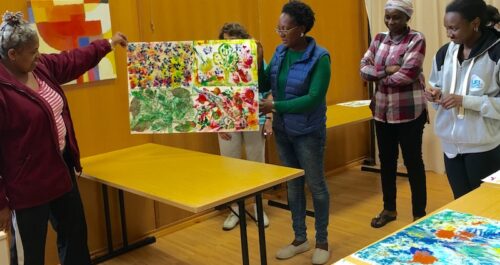

Shirley Biro
Audio Player
SB: Shirley Biro
INT: Interviewer
INT: Can you tell me who you are please?
SB: My name is Shirley Biro.
INT: Explain your relationship to Rosetta Arts?
SB: Yes, I was asked to be on the board, possibly being a trustee, but when I saw how much work is involved, I came on as an advisor and that’s through my capacity of being involved in an awful lot of the voluntary sector in Newham. I’ve lived in Newham all my life and I have lots of connections here.
INT: That was my next question Are you local?
SB: Yes, I was born in Plaistow and raised in Leytonstone which is just over the border. Then got married very young then came back to Newham Plaistow, Canning Town, East Ham.
INT: And what’s your involvement in the voluntary sector – this is what you are famous for?
SB: Em, yeah, I’ve never actually worked for it, but I have wanted to use any spare time I had volunteering for things and I’ve always loved it.
INT: Any particular society or field?
SB: Em, well when I was bringing up my children I was running a sort of mothers and toddler’s group. Then when they were old enough not to need so much attention, I looked around and the first project I found was ‘Conflict and Change’, which was a mediation project for neighbours and that was fascinating! I met loads of diverse people from Newham, lots of different ethnicities, races and learned am awful lot, and more importantly, gained a lot more confidence in myself, which I didn’t have before.
INT: Was this very much about conflict resolution?
SB: Yes, mediation between neighbours.
INT: It sounds legal. Was it legal?
SB: No, it probably is more legal these days, but these are conflicts between neighbours living next door to each other. It could be – you’re parking in my spot, or your garden has overtaken me, or its noise, or its children. There’s lots of different reasons.
INT: And how did they end up needing a body to negotiate on their behalf?
SB: A lot of referrals came through the council and then a lot of people seem to know about us. It’s a good question actually. We were more prominent then as we was always there. In those days people knew where to come. I was a case worker. There were two of us used to go out and then very quickly I was Chair before I knew what I was doing.
INT: How many other organisations are you involved in?
SB: After that I was asked to be on the board of a project called Your Space which again is no longer with us. I have seen the demise of both of those, which is very painful, and both were run by a psychotherapist who spent 3 days a week with the NHS and the other time he spent building up this project. It was counselling to begin with. Then it was groups of people about overcoming obstacles and building esteem… His own initiative from different funding bodies. He was offered quite a good grant from the NHS because they saw the value in this, but unfortunately, because it was his project and he didn’t want anyone else involved in running it, they said he needed to partner with another organisation who could provide the backroom office support, which he didn’t want to do cos it was his project. Then he lost the grant.
INT: Which route took you to Rosetta?
SB: I’ve always been fascinated by emails and where they connect people. I was also on the funding body of small grants for voluntary organisations, so I was collecting all these emails. I’m also a governor for East London Health Foundation Trust (Community and Mental Health), and I was doing some task groups with the council and they were saying they wanted to work with the voluntary sector more, but then I realised that they didn’t know how to contact them. There was no directory in the borough at all, they had lost funding, which was quite a shock for me, quite shameful really! So, I started putting together what I had, as a sort of exercise, and then the pandemic struck and people really, really needed the voluntary sector. We already had the food banks going; we had advice centres; we had everything, but then it became really crucial and people started sending me all their details and that’s when the directory started to grow and blossom.
INT: Explain what happened during that time, what is it people needed?
SB: Where they were and what was there. Information.
INT: How does the scientist partner up with the arts organisation?
SB: As I say, I’m not an artist at all, but I started collecting tall this information and it was all on excel as that’s all I knew at the time and Rosetta was on this list. I was connecting them with other places and they started to appreciate what I was doing, and they said, would you like to be on our Board. I said I’m not an artist, I’m a scientist, but they said they wanted me for the connections I had.
INT: What’s your area of science?
SB: I’ve got a degree in genetics and biochemistry, a masters in molecular immunology and I worked in an immunology department. I started studying for a PhD and I said, what am I going to do with all of this, and I started volunteering more just to meet people.
INT: What do you do for Rosetta now?
SB: I’m an advisor. It’s a recent posting, but I sit on the Board meetings and I sort of suggest thighs to them they might not be aware of.
INT: How are you enjoying the role?
SB: Oh, I’m fascinated by the work you do as I’ve always been an advocate on mental health. I saw the mental aspect of what you do here and that was a draw.
INT: What is it Rosetta are doing in terms of mental health?
SB: There are lots of things people can do to improve mental health, I mean my first interest was n loneliness, in bringing people together to meet each other. Then there are so many other things, there’s singing, gardening and art is another way. It’s whatever appeals to people. If artists are interested in it they can use it. To me, mental health is about looking inwards. If you can focus with something and create something with other people, immediately mental health improves.
INT: Where do you see the organisation at the moment?
SB: Wow! It’s the stuff it is getting into, the ideas they’ve got and the people they are bring on is exciting.
INT: What kinds of things do see Rosetta doing in the future?
SB: Em, they were trying to get this building in green Street, Upton Park, which would have been rough in a community that needed the work, The council let them down, that’s a real shame
INT: Do you see further development for capital development?
SB: Yes, they could do more outreach work. You can’t expect people to go in a do pottery and people to clean up after you, you need a building, You need a building
INT: How have Rosetta moved forward despite the decline in arts funding?
SB: Somehow, they are doing it, they are still bringing in the funds. They need to teach other organisations how to do it. They have a creative network, Creative Arts Network.
INT: What single piece of advice would you like to give the new CEO?
All I can think of is to carry on the good work. I’m not too involved with the vision and the strategy, but from what I’ve seen its working and right, just spread it around to buildings.
INT: What’s Rosetta’s greatest legacy?
SB: Well, you’re one are you? Yeah, if you’ve got some sort of gift or talent for art, draw it out. Rather than just do it for a hobby, you can do it for a living, is that right?
INT: Ideally
SB: I’m always a bit weary of some board meeting, but as soon as I stepped through the door here, I felt welcomed, a sense of belonging.

